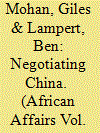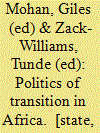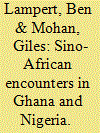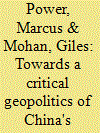|
|
|
Sort Order |
|
|
|
Items / Page
|
|
|
|
|
|
|
| Srl | Item |
| 1 |
ID:
118965


|
|
|
|
|
| Publication |
2013.
|
| Summary/Abstract |
Most analyses of China's renewed engagement with Africa treat China as the driving force, and little recognition is given to the role of African agency, especially beyond the level of state elites. This article investigates the extent of African agency in engagements with China and argues that at various levels African actors have negotiated, shaped, and even driven Chinese engagements in important ways. Suggesting a theoretical framework that captures agency both within and beyond the state, the article provides an empirical analysis of African agency first by showing how elements of the Angolan state created a hybrid set of institutions to broker Chinese investment projects, and second by discussing how African social actors have influenced and derived benefits from the activities of Chinese migrants in Ghana and Nigeria. While both cases demonstrate African agency, the ability of African actors to exercise such agency is highly uneven, placing African politics at the heart of any understanding of China-Africa relations.
|
|
|
|
|
|
|
|
|
|
|
|
|
|
|
|
| 2 |
ID:
054684


|
|
|
|
|
| Publication |
Oxford, James Currey, 2004.
|
| Description |
x, 278p.
|
| Series |
ROAPE African readers
|
| Standard Number |
0852558228
|
|
|
|
|
|
|
|
|
|
|
|
Copies: C:1/I:0,R:0,Q:0
Circulation
| Accession# | Call# | Current Location | Status | Policy | Location |
| 048867 | 320.96/MOH 048867 | Main | On Shelf | General | |
|
|
|
|
| 3 |
ID:
081699


|
|
|
|
|
| Publication |
London, Sage Publications, 2007.
|
| Description |
xi, 363p.
|
| Standard Number |
9781412945646
|
|
|
|
|
|
|
|
|
|
|
|
Copies: C:1/I:0,R:0,Q:0
Circulation
| Accession# | Call# | Current Location | Status | Policy | Location |
| 053416 | 338.9072/THO 053416 | Main | On Shelf | General | |
|
|
|
|
| 4 |
ID:
130282


|
|
|
|
|
| Publication |
2014.
|
| Summary/Abstract |
China's renewed engagement with Africa is often framed as a form of imperialism, with the growing number of Chinese migrants on the continent seen as an exploitative presence. Such claims have generally been based on little evidence, and where more detailed empirical studies have emerged, they tend to emphasise the tensions and conflicts that have arisen. Our research on Chinese migrants in Ghana and Nigeria suggests that while there are concerns about Chinese competition in the informal retail sector and the treatment of local labour in Chinese enterprises, narratives of apparent tension and conflict are often much more nuanced than is generally recognised. Furthermore, more convivial and cooperative relations have also emerged and these have facilitated important opportunities for Africans to benefit from the Chinese presence. However, while the presence of Chinese migrants in African socio-economic life can be more integrated and mutually beneficial than is often assumed, the ability of African actors to benefit from this presence is highly uneven, placing the politics of class at the centre of any understanding of Sino-African encounters.
|
|
|
|
|
|
|
|
|
|
|
|
|
|
|
|
| 5 |
ID:
099049


|
|
|
|
|
| Publication |
2010.
|
| Summary/Abstract |
China, in its quest for a closer strategic partnership with Africa, has increasingly dynamic economic, political and diplomatic activities on the continent. Chinese leaders and strategists believe that China's historical experience and vision of economic development resonates powerfully with African counterparts and that the long-standing history of friendly political linkages and development co-operation offers a durable foundation for future partnership. Both in China and amongst some Western commentators a form of exceptionalism and generalisation regarding both China and Africa has been emerging. In this article instead we seek to develop theoretical tools for examining China as a geopolitical and geoeconomic actor that is both different and similar to other industrial powers intervening in Africa. This is premised on a political economy approach that ties together material interests with a deconstruction of the discursive or 'extra-economic' ways by which Chinese capitalism internationalises. From there we use this framework to analyse contemporary Chinese engagement in Africa. We examine the changing historical position of Africa within Beijing's foreign policy strategy and China's vision of the evolving international political system, looking in particular at China's bilateral and state-centric approach to working with African 'partners'. Chinese practice is uncomfortable and unfamiliar with the notion of 'development' as an independent policy field of the kind that emerged among Western nations in the course of the 1950s and increasingly China has come to be viewed as a 'rogue creditor' and a threat to the international aid industry. Rather than highlighting one strand of Chinese relations with African states (such as aid or governance) we propose here that it is necessary to critically reflect on the wider geopolitics of China-Africa relations (past and present) in order to understand how China is opening up new 'choices' and altering the playing field for African development for the first time since the neo-liberal turn of the 1980s.
|
|
|
|
|
|
|
|
|
|
|
|
|
|
|
|
|
|
|
|
|